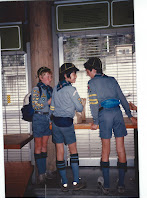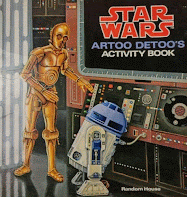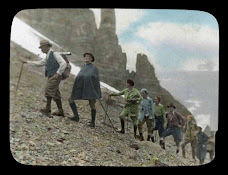Within the same month, 2 highly anticipated local hiking guidebooks are being released by the same publisher:
Destination Hikes in and Around Southwestern British Columbia by Stephen Hui
AND
Backpacking in Southwestern British Columbia by Taryn Eyton
Along with Hui's earlier "105 Hikes", these books could almost be seen as a series and combined, some of the latest entries into the local guidebook market (Vancouver and beyond) for their areas. As a guidebook collector, and self-proclaimed book bagger I aim to help you decide if these books are worthy of your hiking dollars.
Before proceeding (if not a spoiler alert), for full disclosure I know Stephen Hui and the mapping specialist for both of his books and have met Eyton at least once. In other words, this "review" could be seen as biased but if I didn't feel these books were a great addition to anyone's collection, I'd likely choose not to write anything at all. That said,... if I think there is room for improvement somewhere, or something that might not appeal to others, I'll try to qualify that and say it.
My Background:
I own a sizable library of local outdoor recreation guidebooks spanning form the early 70s to... today. These books cover mostly BC and Washington, and beyond that, only select US based hiking areas in the Southwest. Although I'm "semi-retired" from going at it aggressively, I've completely "book bagged" a handful of these and have found it a great way to ensure I see a nice variety of locations for my precious hiking hours.
I also subscribe to many of the more common online resource providers as part of my toolkit for seeking GPS tracks and recent conditions (Livetrails, All Trails, Viewranger and more).
In 2002 I started Wanderung.ca with my friends and the organization has propelled several thousand group adventures over the last 2 decades.
Review: Backpacking in Southwestern British Columbia by Taryn Eyton
I was really pleased to hear about this book coming out because most recent SW BC guidebooks go very light on the camping specific details. Almost all current publications assume you can make an assault on a summit and return in one day and would figure out the rest yourself should you want to stay the night. The fact is, the greatest adventures I've experienced tend to have involved a 2nd day and a ton of the unknown details for those trips emerged from the camping logistics (water, regulations, etc.). Spending downtime with your friends, looking at the stars, and cooking a meal together is really superior to just hiking and it is about time someone assembled this book.

My first impression of this book is that the formatting looks very, very similar to Hui's original 105 Hikes and latest book. Well,.. there is a reason for that, it is the same publisher and the same design team and frankly, .. I like that. Hui's book had a great aesthetic and logic for a functional guide, plus I don't want to relearn my way around. It has all of the standard disclaimers and intro chapters but I think Eyton's is a bit shorter but more informative than most (please everyone,.. read her Leave No Trace section). Formatting may seem like a boring thing to look at but for guidebooks,.. it matters (just ask anyone about Dawn Hanna's elevation profiles instead of maps...).
That all being the case, the other Greystone books aren't identical in layout and the differences are important and well chosen on Eyton's part. In fact, between Eyton and Hui, I think the formatting is approaching "perfection" for my tastes but here are the formatting "innovations" I've found so far I think really add to Backpacking:
The trip planner: How many times have I wished for a km by km breakdown of the trail I'm hiking (junctions, landmarks etc.) instead of sifting through paragraphs of text and sometimes even writing my own summary? A lot. This book has them. Hallelujah.
Itemized Key Details: Both in the individual trail sections and the handy summary table, Eyton lets you know if a given location has fees, dog leash regulations, number of camping pads or cabin bunks, and more. More importantly, they are separated out form the other text. This is huge! I don't think any guide book in my collection does as good a job as this one in this regard.
Will dog owners and the new instagrammers heed these warnings? Fuck no! But as a rule follower I like to know what is deemed ok in a sensitive area so I can at least feel smug and superior as I try to sleep in my tent listening to someone else's portable stereos and crackling brush fire.
Best months: Ooohhh! Controversial!! Safety nuts love to debate this one. Of course we should all look at the conditions whenever we plan to go somewhere but the author had the guts to go 20 years back and include "optimal months". I think this is important. Yes snow might never recede somewhere in a given year but help people narrow it down at least. Better yet, maybe really help out the novices that often ping me about alpine destinations once they have experienced an unseasonably warm March day at sea level. As a book bagger, I need some rough approximation to help me plan a year of trips and Eyton does this (thanks for having the guts!).
If I had to pick one knock against this book, I'd have to look hard, but it might be that the selection of trips. Take a random group of seasoned Vancouver backpackers that has been at it for a while and ask them to list the 40 most common destinations,.. and you'd have a very high correlation with the TOC of this book. For me, 8 of 40 I had not already done and only 2 of them I'd not at least researched (or heard of).
Although I think I was selfishly hoping for more fresh discoveries... there is a reason for that. Eyton made what I assume had to be a hard choice,.. on top of an ethical one to craft this selection. She very clearly in the first pages of her book defines why she has selected certain hikes over others. I won't repeat the whole list (you need to buy the book for that!), but I'll highlight the ones I'm referring to above:
4X4 not required: For those that know hiking in BC, you will know how limiting this might be. This is the hard choice I refer to above. With only space for 40 trips, it would be shame to have people buy the book and be able to hike only 30... Eyton had to draw a line and chose no need for anything beyond 2WD access (or at worst combined with extra doable hiking distance that those blessed with clearance could shorten by driving).
Supported by Land Management: By this she is saying that unless a government agency will ensure the habitat is protected she is not going to direct people to it. This usually means tent pads and toilets (though not always). That is a tough and limiting choice. Eyton is a trained educator in Leave No Trace adventuring and knowing that, this tough choice to exclude some real eye poppers and smells of one thing: integrity. I can get behind that. I often wonder if these books are part of the problem with overrun trails and personally have some guilt along those lines for my part in propelling group travel in the region through Wanderung. I don't think that written the way it is, this book does anything but make the right choices in that regard and attempt to educate those that simply may not be aware.
Lastly, on this topic, I need to remember that not since Brian Gover's BC Car-Free or perhaps some of the Copeland's books has anyone really given camping specific details much lip service. In other words, of course this book should be rolling out the classics, it is the most current and most foundational resource out there (now) on this topic locally. Do you know anyone with a thoroughly researched recent account of the details you need to hike the whole Howe Sound Crest Trail? I don't.
I think the way to think about this book is that if you are a Vancouverite into backpacking or getting into it,.. it might be a one stop shop for your regional "rite of passage" trips and if you complete all of them... I'm hoping Eyton has volume 2 lined up.
Review: Destination Hikes in and Around Southwestern British Columbia by Stephen Hui
The author may not appreciate my first comment here but: though Destination Hikes is not officially a follow-up to 105 Hikes,.. it sort of is.
Not unlike bonus levels in a favourite video game, Hui's latest release has a very familiar format, and when one of the old 103 Hikes previous edition classics appears such as Diez Vistas or The Sisters (Lions),.. it is hard to deny that this book feels like a sequel. But,.. I loved Star Wars and that doesn't mean Empire wasn't also awesome (my review of 105 Hikes
here).
I'm going to start by just saying if you liked the original, or hiking around here in general.. buy it. There are differences which I'll outline below but nothing that should sway a buying choice.
Formatting: 105 Hikes brought many improvements over the earlier Macaree and Bryceland editions and they continue here:
- advances in affordable colourized printing
- land acknowledgements and forewords by BC's first people
- handy tables and checklists
- more...
There are key differences and I think they all make sense. For starters, the purpose of this work is less about continuing the tradition set by the Macarees for hikes of a certain range of difficulty and length. I'm pretty certain Hui took some heat for slipping in some sub-5 hour hikes of minimal stats in 105 from the orthodox BCMC hardcores. Destinations claims to focus on payoffs, not kms, for each trail, which breaks from the tradition of killing yourself to climb 8 hours of mud to only see a grown over view that you could beat by biking up Little Mountain.
Also being free of the shackles of the 103 Hikes lineage allowed Hui to write - gasp, more than 2 pages per hike! Included in that are what in my opinion are much better (and larger) photos than what surfaced in 105 Hikes. I guess the extra 50 hikes sops up some space!
Two edition "innovations" that must be noted are the Feature Icons and the Stops of Interest boxes:
Feature icons summarize at the top of the title page of the hike what you stand to see by doing this hike. Colourfully coded circles with google maps style icons will indicate "Big tree", "Waterfalls", "Coastal views", "Wildflowers" and more. The only way to improve on that is a magical book that can dynamically tell you when the bugs are hitting! These items are what I call the "gravy" for your sweat and blisters and it also can feed into planning. Nothing is worse that executing a hike and not being aware that it is known for wildflowers or a waterfall and timing that wrong as you buddy shows some amazing photo 3 weeks later.
Stops of Interest really is where Destinations becomes about,.. destinations. As a prolific trip organizer in my day I always wanted to make sure we made a full day of it wherever we went. Hell, this is our leisure time so I don't want to drive to Chilliwack and deadhead it back - we were travelling as much as we were hiking. A great pub or pull-over viewpoint was always welcome and Stephen Hui has injected yellow boxes into every destination's section to indicate exactly those kinds of sites for the area you have decided to adventure. Othello Tunnels, Alexandra Bridge, or a plethora of museums and cultural centres. No pubs or bakeries, but no one is perfect.
This book is a great addition to your library and will fill hours as you sit inside on a rainy day and dream out your upcoming adventures.
Conclusion
Something I've not addressed here is the utility of hiking books,.. at all. There are great electronic resources out there, especially where mapping is concerned so has the guidebook gone the way of the dodo? I don't think so.
Online content is more accessible than ever and expanding almost as rapidly as,.. crappy and irresponsible writers. I've read online reports with: illegal acts, environmentally destructive acts, and all variety of trail information that is incorrect. Search and Rescue calls these days almost regularly say "the person was following bad instructions on their cell phone".
Between Steve Chapman's verified maps and the thorough and recent research done by these authors,.. I think you are in better hands with books like these as a base than someone that jotted down their best memory of the trail after trail running it. With books you can also calibrate your fitness level based on previous usages,.. you have no idea what you are in for with online content (a braggart trail runner, or someone dragging along a child...?).
Clearly, I've enjoyed what I've seen in these books. I also just enjoy thinking of my friends and acquaintances that are newer to hiking and how both books give them well thought out options where to go with some context to go there safely and responsibly.
I urge people to not do what I normally do and skip the intro sections... they are worthy of your time. Now more than ever it is evident that new hikers are needing a north star regarding caring for these amazing trails we have and these books could serve to raise that awareness.
Buy them. Buy them both. And don't rule out an e-book version which can be good for printing and especially if you are backpacking, convenient to carry along with your novels while your paper copy sits nice and dry at home to be lovingly flipped through in the off-season.













































